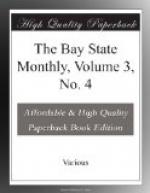On the 4th of February, while the Peace Conference, so called, met in Washington to consider propositions of compromise and concession, the delegates of the seceding States assembled in Montgomery, Alabama, to organize their conspiracy into an avowed and opened rebellion. On the 9th Jefferson Davis, of Mississippi, was elected President, and Alexander H. Stephens, of Georgia, Vice-President of the new Confederacy. On the 18th Davis was inaugurated.
On the 1st of March General Beauregard was, by the rebel government, placed in command of the defence of Charleston harbor, with orders to complete preparations for the capture of Fort Sumter. The Governor had been exceedingly anxious that the capture should be attempted before the 4th of March. “Mr. Buchanan cannot resist,” he wrote to Davis, “because he has not the power. Mr. Lincoln may not attack, because the cause of quarrel will have been, or may be considered by him, as past.”
President Lincoln was inaugurated on the 4th of March, 1861. With an unanswerable argument against disunion, and an earnest appeal to reason and lawful remedy, he closed his inaugural address with the following impressive declaration of peace and good-will:—
In your hands, my dissatisfied fellow-countrymen,
and not in mine, is
the momentous issue of civil war.
The government will not assail you. You can have no conflict without being yourselves the aggressors; you can have no oath registered in heaven to destroy the government, while I shall have the most solemn one,—to preserve, protect, and defend it.
I am loath to close. We are not enemies,
but friends. We must not be
enemies. Though passion may have
strained, it must not break, our bond
of affection.
The mystic chords of memory, stretching from every battle-field and patriot grave, to every living heart and hearth-stone all over this broad land, will yet swell the Chorus of the Union when again touched, as surely they will be, by the better angels of our nature.
On the 15th of March President Lincoln, having been advised by General Scott that it was now “practically impossible to relieve or reinforce Sumter,” propounded the following question to his cabinet: “Assuming it to be possible to provision Sumter, is it wise, under all the circumstances of the case, to attempt to do so?” Five of the seven members of the cabinet argued against the policy of relief. On the 29th the matter came up again, and four of the seven then favored an attempt to relieve Major Anderson. The President at once ordered the preparation of an expedition. Three ships of war, with a transport and three swift steam tugs, a supply of open boats, provisions far six months, and two hundred recruits, were fitted out at New York, and, with all possible secrecy, sailed on the 9th and 10th of April, “under sealed orders to rendezvous before Charleston harbor at daylight on the morning of the 11th.”




